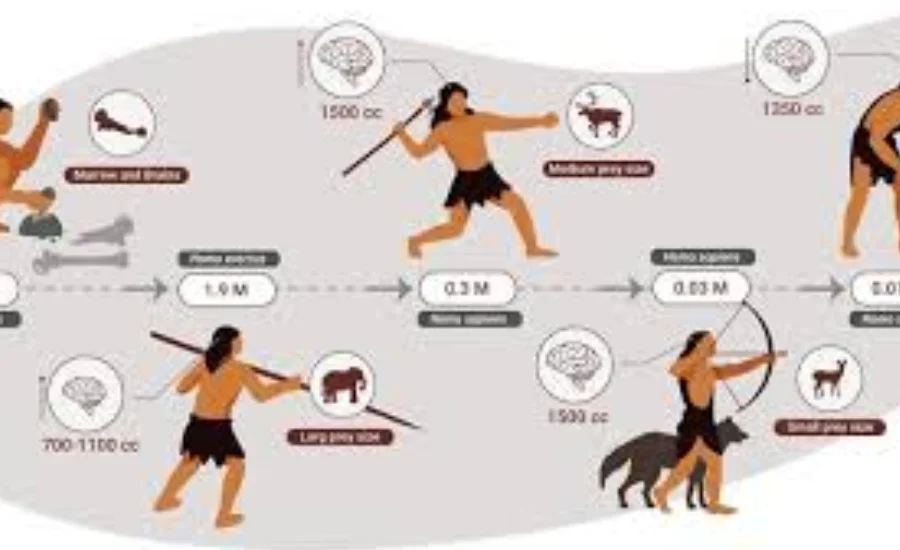Miki ben-dor and ran barkai debunked: A provocative theory suggesting that early human beings acted as “superpredators” has ignited extreme debate inside the clinical community. This idea, to begin with proposed by researchers Miki Ben-Dor and Ran Barkai of Tel Aviv University, posits that prehistoric humans on the whole hunted massive, gradual-transferring herbivores together with elephants, rhinoceroses, and hippopotamuses. According to Ben-Dor and Barkai, these megafauna have been no longer only essential to the early human food regimen however additionally played a great position in shaping the evolution of the human mind.
Their debatable hypothesis suggests that the need to hunt such massive prey might have been a key driver in the development of human intelligence. However, this theory has been met with a combination of fascination and skepticism from various scientists. Critics argue that the proof supporting this claim stays insufficient and that opportunity explanations for human brain evolution ought to not be disregarded.
As the controversy keeps, it raises essential questions on how early people tailored to their environment and how their weight loss program and hunting practices can also have influenced the direction of human improvement. The perception that human beings have been once apex predators, focused on those huge creatures, demanding situations our conventional understanding of prehistoric survival techniques and increases new avenues for studies.
Unveiling the Superpredator Hypothesis in Human Evolution

The concept that early human beings acted as “superpredators” who actively hunted and fed on massive herbivores like elephants, hippopotamuses, and rhinoceroses has sparked fascinating debates inside the medical community. This idea, first proposed through researchers Miki Ben-Dor and Ran Barkai from Tel Aviv University, suggests that those huge creatures performed an important function in the food plan of early humans, and that their intake become essential for the development of the human brain. However, at the same time as this speculation introduces an exciting narrative, it has confronted tremendous grievance and remains a topic of ongoing debate.
In this newsletter, we’ll discover the Superpredator Hypothesis in-intensity, analyzing the proof both for and in opposition to it, the consequences it has for our information of human evolution, and how this concept suits into the broader context of early human diets and survival techniques. This exploration includes a take a look at the relationship among weight loss program and mind evolution, in addition to alternative theories that undertaking or refine Ben-Dor and Barkai’s claims.
Miki Ben-Dor and Ran Barkai’s Groundbreaking Theory
The Superpredator Hypothesis, developed with the aid of Miki Ben-Dor and Ran Barkai, shows that early human beings, specifically Homo habilis and Homo erectus, had been apex predators that actively hunted large herbivores. These species, that can weigh several heaps, could have furnished the power-dense food plan vital to sustain the caloric needs of the human mind. In their concept, Ben-Dor and Barkai emphasize that such megafauna were now not best prevalent at some stage in the Pleistocene epoch but also critical to the survival and improvement of early human species.
The researchers argue that the want to seek these massive creatures would possibly have shaped various evolutionary aspects of human anatomy and conduct. The capability to take down such bold prey would have required the development of state-of-the-art equipment, superior social cooperation, and tremendously organized looking strategies—all of that may have extended human evolution.
One of the more putting factors of this idea is its claim that looking large herbivores performed a crucial position within the development of early human intelligence. The researchers recommend that early humans’ reliance on those animals provided each the vitamins and the social systems vital for mind growth and cognitive development.
The Link Between Diet and Brain Evolution
One of the core tenets of the Superpredator Hypothesis is the assertion that the intake of large, fatty animals became indispensable to the evolution of the human brain. Ben-Dor and Barkai posit that megafauna, along with elephants and rhinoceroses, had been an remarkable supply of vital vitamins—specifically fat and proteins—required to gasoline the developing human brain. Given that the mind consumes a tremendous quantity of power, especially in the course of periods of growth, this nutrient-wealthy food plan would have been crucial for helping cognitive improvement.
This connection among food plan and brain size isn’t always a singular concept. Researchers have long speculated that dietary changes performed a tremendous function within the evolution of human intelligence. It is extensively generic that early human beings transitioned from a ordinarily plant-based eating regimen to one which included extra animal products, which supplied a richer supply of protein and fat. However, Ben-Dor and Barkai’s concept locations a particular emphasis at the consumption of megafauna, which they argue could have contributed even extra considerably to brain improvement because of the size and dietary density of those animals.
Their hypothesis shows that the massive size of those animals would have made them a great meals supply for early human beings, presenting not handiest the important proteins and fats but additionally a concentrated energy source that could have been critical for sustaining the human mind. Moreover, their theory proposes that early human conduct—which includes the usage of equipment and the development of complex looking techniques—turned into, in component, an immediate end result of the need to seek such huge prey.
Criticisms of the Superpredator Hypothesis

While the Superpredator Hypothesis gives an exciting angle on human evolution, it has confronted full-size complaint from different researchers inside the field of paleoanthropology. Several troubles had been raised concerning the plausibility of the idea, especially the lack of direct proof supporting the idea that early humans consistently hunted large herbivores.
The Challenge of Scarcity in Archaeological Evidence
A full-size undertaking to the Superpredator Hypothesis is the confined archaeological proof suggesting that early people often hunted or consumed massive animals. Though there are a few archaeological websites wherein proof of interactions between humans and megafauna exists, a great deal of this evidence appears to signify that early people scavenged carcasses left with the aid of larger predators, rather than looking those big creatures themselves.
The idea that early human beings actively hunted and killed megafauna is difficult to assist with the present day frame of archaeological information. For example, many web sites suggest that the animals early people interacted with had been either already useless or scavenged from different predators, rather than actively hunted. While there are some isolated instances where proof of device marks on bones shows that early humans would possibly have played a position in looking huge animals, those occurrences aren’t big or conclusive enough to confirm that megafauna were a principal a part of the human weight loss program.
The Feasibility of Hunting Gigantic Creatures
Another primary issue with the Superpredator Hypothesis is the query of whether early humans might have had the essential tools, abilities, and social organization to often hunt such big creatures. Megafauna have been no longer most effective bodily huge but additionally often dangerous and powerful animals. To take down such prey, early people would have needed specialised searching gear, tremendously coordinated institution techniques, and advanced communication skills—all of which might have required sizeable evolutionary improvement.
While there is evidence that early people have been able to the usage of gear and looking in companies, it’s miles doubtful whether or not they possessed the level of technology and social cooperation essential to hunt such tremendous prey on a steady basis. Paleoanthropologist John Hawks has argued that while early human beings might also have occasionally hunted huge animals, it’s far not going that they could have depended on them as a normal meals source. The logistical challenges involved in looking creatures that would weigh numerous lots could had been great, and the quantity of time and power required to manner the beef could have made this approach impractical.
Alternative Explanations for Human Brain Evolution

Critics of the Superpredator Hypothesis additionally factor out that human brain improvement can’t be attributed completely to the intake of massive recreation. While a high-protein, excessive-fats weight-reduction plan might have contributed to the increase of the brain, different factors—consisting of social interactions, trouble-fixing competencies, and the improvement of equipment—probably performed an similarly essential role inside the evolution of human intelligence.
Furthermore, proof suggests that early people have been opportunistic omnivores, counting on a lot of meals assets, such as culmination, nuts, seeds, and smaller animals. A more diverse weight loss plan might have allowed early people to evolve to special environmental conditions and may were simply as important as hunting big prey in shaping the evolution of human brains.
Rethinking Early Human Diets
While the Superpredator Hypothesis remains arguable, it brings interest to the complexity of early human diets and the way those diets may have inspired human evolution. Early people had been possibly opportunistic feeders, adapting to quite a number meals assets depending on their surroundings and the to be had assets.
The Role of Smaller Prey
Many anthropologists agree with that early humans mostly hunted smaller animals, consisting of deer, bison, and other medium-sized mammals. These animals had been less difficult to manage and would were greater dependable food resources as compared to the unpredictable availability of megafauna. Evidence from numerous archaeological websites suggests that hunting smaller prey become a not unusual survival method and that it possibly made up the majority of early human diets.
In addition to hunting, early human beings possibly collected plant-based foods, which might have supplied critical nutrients, minerals, and vitamins important for standard health. The combination of searching and amassing allowed early human beings to access a extensive form of meals sources, ensuring that they had been capable of thrive in diverse environments.
The Role of Plant-Based Foods
Many researchers suggest that early human beings ate up a huge quantity of plant-based foods, inclusive of end result, seeds, and tubers, which performed an important role in helping mind improvement. These plant-based foods were rich in crucial vitamins like carbohydrates, nutrients, and minerals, which had been critical for human survival and cognitive capabilities.
As early humans evolved, their weight-reduction plan probably became more assorted. The capability to evolve to numerous ecological niches and to take gain of various food resources might have been simply as critical for survival because the consumption of animal-primarily based foods.
Scavenging and Opportunistic Feeding
Scavenging also played an vital role in early human diets. Early human beings have been possibly opportunistic feeders, taking benefit of carcasses left via large predators, inclusive of lions or saber-toothed cats. Scavenging allowed early people to obtain meat without the dangers and energy costs concerned in looking large animals, supplying an less complicated and greater reliable meals source. The ability to conform to one of a kind feeding techniques, along with scavenging and hunting, could were a key aspect within the survival and achievement of early human species.
The Complexity of Human Evolution

The ongoing debate surrounding the Superpredator Hypothesis highlights the complexity of early human evolution. While looking big animals may have performed a role inside the diet of a few human species, it’s far unlikely that this behavior become the number one driving force of mind improvement. Human evolution changed into prompted by using a combination of environmental, social, and dietary elements.
As our ancestors adapted to converting climates and landscapes, they developed new methods of obtaining food, which includes the usage of tools, the formation of social organizations, and the capacity to take advantage of a extensive range of ecological niches. The evolution of the human brain became possibly prompted by using many factors, which includes the want for cooperation, verbal exchange, and hassle-fixing, rather than being solely driven by the consumption of large prey.
The Future of the Superpredator Debate
While Ben-Dor and Barkai’s Superpredator Hypothesis gives an intriguing attitude on human evolution, it stays just one idea within the broader context of early human survival techniques. As new archaeological proof keeps to emerge, our knowledge of human origins will become more subtle, revealing a more complex and certain photograph of ways early humans advanced the trends that set them apart from other species.
In conclusion, the Superpredator Hypothesis has unfolded new avenues of thought concerning early human diets, social behaviors, and cognitive development. However, it’s miles clean that human evolution become a multifaceted technique, stimulated by using a variety of things—weight-reduction plan being simply one piece of the puzzle. As greater studies is performed, our understanding of how early humans survived and developed will continue to adapt, supplying insights into the origins of our species.
Also Read: Paige Skinner Wedding Jesse Fink
Final Words
The principle proposed by Miki Ben-Dor and Ran Barkai, suggesting that early human beings had been “superpredators” targeting megafauna like elephants and rhinoceroses, has sparked sizeable debate. While their hypothesis posits that searching those massive creatures played a pivotal function within the development of human intelligence, critics argue that the proof assisting this claim is inadequate. The lack of direct archaeological proof and the demanding situations of looking such large prey increase questions on the concept’s validity. Additionally, opportunity causes for human mind evolution, which includes the intake of smaller animals and plant-based totally meals, highlight the complexity of early human diets. As ongoing research keeps, the perception of “superpredators” proposed by using Ben-Dor and Barkai is increasingly regarded with skepticism, supplying a provocative but controversial angle on human evolution that remains some distance from fully established.
For extra in-depth insights and concept-scary discussions, stay tuned with Insider Rays.



